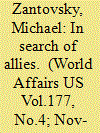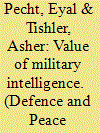|
|
|
Sort Order |
|
|
|
Items / Page
|
|
|
|
|
|
|
| Srl | Item |
| 1 |
ID:
136872


|
|
|
|
|
| Summary/Abstract |
In this article we seek to address the emerging role of the European Union (EU) as a security and intelligence actor from the perspective of counter-terrorism. Intelligence as a process and product has been strongly promoted by the EU as a useful and necessary tool in the fight against terrorism, radicalization, organized crime and public order problems. A range of agencies has been established that collect, analyze and operationalize intelligence in view of strategically defined security threats. Examples are Europol and Frontex. This article makes an inventory of their roles and competences in the field of intelligence and looks at the list of instruments that encourage the sharing of intelligence between different law enforcement and security agencies. Moreover, it is argued in this article that as intelligence becomes more hybrid and as the EU only holds light powers of oversight on ownership and integrity of data, considerable governance challenges lurk around the corner. As ‘intelligence’ is usually a complex and sensitive product, it often travels outside formal bureaucratic channels, which undermines accountability and transparency of where, how and for what purpose the intelligence was gathered.
|
|
|
|
|
|
|
|
|
|
|
|
|
|
|
|
| 2 |
ID:
136871


|
|
|
|
|
| Summary/Abstract |
With the 2001 EU Action Plan and the 2005 EU Counterterrorism Strategy, the European Union has unfolded a roadmap for counter-terrorism measures and an itinerary of actions to be undertaken by the Member States. In some respects, the EU strategies, flanked by the Action Plans in the Area of Freedom, Security and Justice, as well as more concrete forms of cooperation such as the adoption of the EU Arrest Warrant, the Member States have been encouraged to use the same conceptual apparatus, to adopt the precautionary logic (pre-terrorism), and to adopt similar organizational models (multi-disciplinary cooperation) and tools (surveillance, public-private cooperation, etc.). This may have led to a level of convergence between the national counter-terrorism approaches, in line with what the Action Plan on Organized Crime in 1997 sought to achieve by demanding from Member States that they would adapt their national structures. The number of policy-impulses that has emanated from the EU Counterterrorism strategy and ensuing policy documents has been rather numerous. Moreover, this article seeks to take stock of whether all proposals have led to the full adoption and implementation of instruments. The article assesses whether the EU strategies have encouraged ‘deep integration’ between the Member States in terms of a common threat assessment, pooling resources, sharing intelligence, mutual legal assistance in anti-terrorist investigations, creating joint investigation teams and transferring suspects between Member States. The primary focus of this article will be on levels of legal convergence between six Member States.
|
|
|
|
|
|
|
|
|
|
|
|
|
|
|
|
| 3 |
ID:
134844


|
|
|
|
|
| Summary/Abstract |
During the Czech Republic’s first year of existence, most Czechs felt that nothing much had happened. True, there was now a new country east of the Morava River, where they had previously gone to hike and ski without the need of a passport. But nothing had changed within the Czech lands, Bohemia, Moravia, and a stump of Silesia. They were still there, as they had been for a thousand years, a country of milk and honey, hardworking, peaceful people, known around the world for their skills, intelligence, and culture.
|
|
|
|
|
|
|
|
|
|
|
|
|
|
|
|
| 4 |
ID:
137057


|
|
|
|
|
| Summary/Abstract |
Strategic culture has traditionally been used to detach non-western strategic behaviour from western ideas of rationality, but the concept is commonly used as a practical way of discussing apparent quirks of policy.1 The intelligence field nowadays recognizes the novelty of engaging wholeheartedly with strategic culture. Intelligence agencies have been ill-equipped to question their own assumptions, which trigger failed prediction of military capabilities and political intentions.2
|
|
|
|
|
|
|
|
|
|
|
|
|
|
|
|
| 5 |
ID:
135986


|
|
|
|
|
| Summary/Abstract |
As part of a multi-article presentation about national and social resilience to the military practitioner community, the article initially embeds the concept of resilience into a concept of change. From this grounding discussion, the profiling of national/social resilience is presented as a useful part of building an improved intelligence process of holistic change forecasting. Next, as a better way of seeing and evaluating how different nations and societies will uniquely respond to crises, uniquely recover post-crisis and thereafter change into their future, a way of using resilience change profiling to improve intelligence foresight and forecasting is detailed. Also, an argument is presented that during periods of financial stress, such an approach has efficacy, economy-of-force and other comparative advantage benefits to Western military organizations.
|
|
|
|
|
|
|
|
|
|
|
|
|
|
|
|
| 6 |
ID:
136865


|
|
|
|
|
| Summary/Abstract |
This article builds a model for explaining the development of supranationalism in EU police cooperation, especially concerning Europol. This framework is also helpful for understanding the role of police cooperation in EU counter-terrorism policy. The article begins with a critical analysis of the analytical framework first development in my 2003 book and refines this based key events since 2002, as well a few important scholarly perspectives. According to the new model, supranationalism is explained by ‘interest shapers,’ which include the ‘spillover-enlargement effect,’ crises and shocks, and concerns for national sovereignty, democracy, and pragmatism. The development of these interests and the resulting supranationalism are also affected by ‘institutional dynamics,’ including entrepreneurship, path dependency, and bureaucratic resistance. These factors help to explain recent events and predict future developments concerning EU police cooperation.
|
|
|
|
|
|
|
|
|
|
|
|
|
|
|
|
| 7 |
ID:
134301


|
|
|
|
|
| Summary/Abstract |
Unmanned Aerial Vehicles (UAVs), or drones, have undoubtedly attained a prominent position in contemporary and future defence technologies. Likewise, Asian militaries have continued to realise the operational value of such vehicles, whether for Intelligence, Surveillance, and Reconnaissance (ISR) or combat purpose. In the current times, wherein UAVs are proliferating globally, it remains pivotal to understand their relevance, uses and implications, particularly with regard to emerging powers. It is in this context that the paper seeks to explore and compare the cases of the two rising Asian giants, India and China. The paper explores their UAV programmes, possible defence-oriented employments, and current technological capabilities to produce UAVs. The relevance of UAVs is assessed in terms of India and China's present military doctrines, security requirements (current and future) and how the UAVs fit into their security landscape. Finally, the article delves into the strategic implications of the greater proliferation and rampant employment of UAVs in the region.
|
|
|
|
|
|
|
|
|
|
|
|
|
|
|
|
| 8 |
ID:
136959


|
|
|
|
|
| Summary/Abstract |
This study evaluates the role of military intelligence in an arms race between two countries. The intelligence apparatus of each country evaluates the rival’s capabilities and intentions, and enhances its military capability by increasing the effectiveness of its own weapon systems and reducing the effectiveness of the rival’s weapon systems. Intelligence superiority also yields an advantage in deterrence and preemption. This study shows the following. (a) Investment in intelligence is much less beneficial for small government budgets, low intelligence efficiency, and a low degree of conservatism on the part of the policy-maker. (b) The expenditure on intelligence increases when intelligence efficiency is low and rising, and decreases when intelligence efficiency is high and rising. (c) Being very conservative may be costly to the country. (d) High-quality human capital substantially improves the country’s security and welfare, particularly when the rivals are engaged in a knowledge race in addition to the usual arms race. An application of the model to the Israeli–Syrian arms race demonstrates its validity and usefulness.
|
|
|
|
|
|
|
|
|
|
|
|
|
|
|
|
|
|
|
|
|